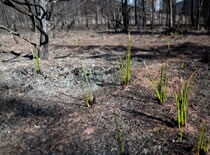- By Marketing
- In Mold Removal
After a Wildfire

- Drive safely: Be alert for broken traffic lights and missing street signs. Watch out for trash and debris on the road.
- Be careful around damaged buildings or structures: Wait to return to buildings during daylight hours, when it is easier to avoid hazards, especially if the electricity is off and you have no lights.
- Cleanup Safely: Wear proper safety equipment, avoid carbon monoxide poisoning, and avoid electrical hazards.
Protect Your Emotional Well-Being
After a disaster, such as a wildfire, you may feel sad, mad, guilty, or numb. You may have trouble sleeping, be constantly watching for danger, or be jumpy, irritable, or angry. Contact with certain people, sights, or sounds may bring back bad memories or an overwhelming sense of grief. These are all normal reactions to stress, as this is a difficult time. Here are some things you can do to help you cope with stress and protect your emotional and physical well-being:
- Stay Active. Volunteer for work in a shelter, community, school, or faith-based organization.
- Help with cleanup and repair if it is safe to do so.
- Spend time with others.
- Participate in activities you enjoy.
- Take breaks from the cleanup efforts.
- Exercise (indoors if air quality is not acceptable).
- Keep a journal.
- Talk about your feelings.
Keep in mind that returning to the way you felt before the disaster may take time. Talk to a psychologist, social worker, or professional counselor if you are having trouble with the following:
- Managing your feelings
- Completing daily tasks
- Caring for your family
Resources
For additional information on how to prevent injuries go to Fact Sheet: Prevent Injury after a Disaster or call 1-800-CDC- INFO.
For coping with stress, use the numbers below for help:
- American Psychological Association 1-800-964-2000
- National Suicide Prevention Lifeline 1-800-273-TALK (8255)
- National Domestic Violence Hotline 1-800-799-SAFE (7233)
- National Child Abuse Hotline 1-800-4-A-CHILD (422-4453)
- Substance Abuse and Mental Health Services Administration 1-877-726-4727
- National Child Traumatic Stress Network
